小学英语常用动名词相关变化总结
一、名词复数的变化规律
1、规则变化
1) 一般情况直接在词尾加-s . 如:chair—chairs;apple—apples;grape—grapes;desk—desks等。
2)以s、sh、ch、x等结尾的词加–es .如:bus—buses;watch—watches;box—boxes;brush—brushes等。 3)以辅音字母+y结尾的词,变y 为i 再加es,baby—babies;city—cities;family—families等。 4)以f或fe结尾的将f或fe直接换成ves. 如:knife—knives;thief—thieves;shelf—shelves等。 2、不规则变化
1)没有规律的变化。如:child—children;foot—feet;tooth—teeth;mouse—mice;woman—women等。 2)单复同形。如:deer—deer;sheep—sheep;fish—fish;yuan—yuan;tofu—tofu;pork—pork等。
3)以o结尾的名词有的加es有的加s. 如:potato—potatoes;tomato—tomatoes;Hero—heroes等。
二、动词第三人称单数的变化规则
1)直接在动词后+s. 如:like—likes;play—plays;read—reads;get—gets;help—helps;ski—skis等。 2)以s, x, sh, ch, 接尾的动词:+es. 如:wash—washes;wacth—watches;teach—teaches;brush—brushes等。 3)以辅音+o接尾的动词:+es. 如:go—goes;do—does等。
4)以辅音+y接尾的动词:变y为i+es. 如:fly—flies;study —studies;carry—carries;sky—skies等。 末尾字母y前为元音字母的,直接在动词后面加-s. 如:play—plays;say—says等。 5)特殊变化。如:be—is;have—has等。这些没有规律,需要加强记忆。
三、动词现在分词-ing形式的构成
1)一般情况在动词原形后加-ing . 如:go—going;stand—standing;climb—climbing等。
2)以不发音的e结尾的动词,去掉e,再加-ing. 如:write—writing;hope—hoping;care—caring等。 3)以-ie结尾的动词应先将e去掉,将i变成y然后再加-ing. 如:die—dying,tie—tying等。
4)如果动词最后一音节为重读闭音节,最后一个字母需要重复. 如:run—running; stop—stopping;hop—hopping;plan—planning;star—starring;get—getting等. 但辅音x是个例外,无需重复(x其实起着两个辅音的作用)。如:tax—taxing,relax—relaxing等。
5)以-ee,-oe,-ye结尾的动词加-ing时应保留词尾e. 如:see—seeing;hoe—hoeing;eye—eyeing等。 6)以-ue结尾的动词大多应先去e再加-ing. 如:sue—suing;imbue—imbuing;rue—ruing等。
7)以-ic结尾的动词应先在字母c后加一字母k再加-ing. 如:frolic—frolicking;panic—panicking;mimic—mimicking;picnic—picnicking;traffic—trafficking等。

五、动词的过去式变化
1、规则变化
1)一般情况下,在动词词尾直接加-ed. 如:work—worked;piay—played;want—wanted;act—acted等。 2)以不发音的-e 结尾动词,在动词词尾加-d. 如:live—lived;move—moved;decide—decided等。 3)以辅音字母 + y结尾的动词,把-y变为-i 再加-ed. 如:study—studied;try—tried;cry--cried 等。 4)以一个辅音字母结尾的重读闭音节动词,双写词尾辅音字母,再加 –ed, 如:stop—stopped;beg—begged; fret—fretted;drag—dragged;drop—dropped;plan—planned;dot—dotted;drip—dripped 等。 2、不规则变化的动词有很多,规律性不强,需要加强记忆。小学常用的有如下:
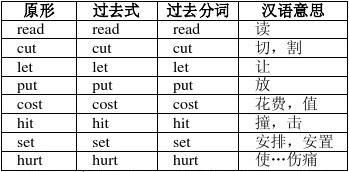


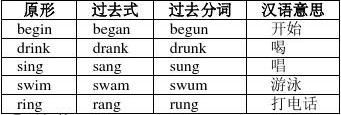
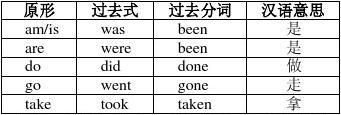

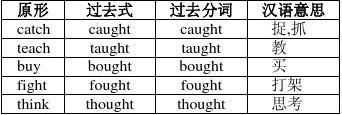



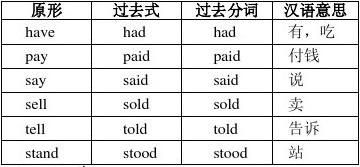
⑥辅音字母和元音字母都变


化规律、动词第三人称单数的变化规律、动词现在分词ing形式的构成、人称代词的变化以及常用动词过去式的变化。望同学们多看多记,加以巩固
第二篇:动名词总结
一、只能后接不定式的动词和短语归纳有的动词后只能用不定式而不能接动名词。如help,ask,
demand(要求), plan, intend, mean(计划), manage设法, do / try one’s best, make an attempt,(努力), learn(学习), wish, hope, desire, expect, long, want, would like, should like, would prefer, wish, (希望、愿意), agree, promise(同意), decide, determine决心, choose, make a decision, make up one’s mind(决定), offer(主动提出), apply(申请), help(帮助), fail(不能、没有), prepare(准备), pretend(假装), refuse(拒绝), happen(碰巧), afford(负担得起), arrange 安排, care 想要, hesitate 犹豫,等。
二、用法归纳有的动词或短语动词后只能用动名词而不能接不定式。如allow, permit(允许),
consider(考虑), suggest, advice(建议), suggest, advice(反复; 不停), finish(完成), imagine(想象), practise(练习), understand(明白), appreciate, enjoy(喜欢), miss(错过; 怀念), prevent(阻止), forbid(禁止), escape(避免), include(包括), forgive, pardon, excuse(原谅), dislike(厌恶), discuss(讨论), report(报道), admit(承认), mind(介意), risk(冒险), can’t stand(不能忍受), burst out(突然开始), feel like(想要), stick to, insist on(坚持), delay, put off(推迟), give up(放弃), be busy(忙于), be worth(值得)等。carry on 继续 / can’t help 禁不住 / feel like 想要/ keep on 继续 / put off 推迟 / set about 开始,着手 / object to 反对 / pay attention to 注意 / get down to 开始认真做 / look forwards to 期盼 / be [get] used to 习惯于 / lead to 导致 / be devoted to 致力于,专用于,等。
三、介词一般接动名词作宾语,但是 except, but, besides三个介词却习惯上要动词不定式作宾语。
如:They are talking about building a bridge over the river. 他们在讨论在河上修建一座桥的问题。They helped the farmers to the fields besides to get in their crops. 他们除了帮助农民们收割庄稼外还帮助农民们犁田。
四、forget, remember, regret 后接不定式表示现在或将来要发生的动作,动名词表示过去已经发
生的动作。I forgot to tell you about it. 我忘记告诉你那件事了。I forgot telling you about it. 我忘记已经告诉你那件事了。
五、mean 接不定式作宾语时,表示一种意图,意思是“打算做,想要做”;接动名词作宾语时,
表示解释,意思是“意味着,意思是”。如:”I didn’t mean to bother you. 我本不想打扰你。What he said means going there by air. 他的话的意思是坐飞机去那儿。
六、try 接不定式作宾语时,表示一种决心,意思是“设法做,尽力做”;接动名词作宾语时,表
示尝试,意思是“试着做”。如:I’ll try to catch up with my class. 我将尽力赶上同学们。I tried reading the text without consulting my dictionary. 我试着不查词典来阅读课文。
七、need, require, want, deserve后接不定式或动名词语态不同:即动名词用主动形式表示被动意
义,而不定式则用被动形式表示被动意义。如:The flowers need watering every day. = The flowers need to be watered every day. 花儿需要每天浇水。注意:若 need, require, want后接动词为句子主语所发出的动作,则只能用不定式,不能用动名词。如:I need to water the flowers every day. 我需要每天给花浇水。
八、can’t help 后接不定式时,意思是“不能帮忙做某事”;接动名词作宾语时,意思是“禁不住做
某事,情不自禁做某事”。如:I’m very busy now, so I can’t help (to) clean the room. 我现在很忙,因此不能帮助打扫房间。The girl couldn’t help crying when she saw her mother again. 当小女孩再次看到母亲时,她情不自禁地哭了起来。说明:以下两个动词后接不定式或动名词(不一定是用作宾语)意思也不同:go on to do sth (做完某事后)继续做另一事) (不定式作状语)go on doing 继续做一直在做的事 (动名词作状语)stop to do sth 停下正在做的事以便去做另一事 (不定式作状语)stop doing sths) 停做正在做的事 (动名词作宾语)
三、既可接动名词也可接不定式作宾语且意义相同的动词 like 喜欢 love 喜欢 hate 憎恨 prefer 宁可begin 开始 start 开始 continue 继续 can’t bear 不能忍受bother 麻烦 intend 想要 attempt 试图 cease停止
He likes to sing [singing]. 他喜欢唱歌。It has started to rain [raining]. 开始下雨了。You needn’t bother to come up [coming up]. 你不必费心过来了。The baby continued to cry [crying] all night. 这孩子哭了一整夜。The old man ceased breathing [to breathe]. 老人停止了呼吸。
注:当 like, love, hate, prefer 与 would, should 连用时,其后只能接不定式。另外,当 begin, start 本身为进行时态或后接 know, realize, understand 等静态动词时,其后的动词只能用不定式。
四、既可接动名词也可接不定式作宾语但意义不同的动词(1) remember(记得),forget(忘记),regret(后悔)后接不定式指该不定式所表示的动作还未发生,后接动名词(有时可用完成式),则指该动名词所表示的动作已经发生。比较:Remember to post the letter. 记住把这封信寄了。(“寄信”未发生)I remember posting the letter. 我记得寄了那封信。(“寄信”已发生)He forgot to pay me the money. 他忘记要给我付钱了。(“付钱”未发生)He forgot paying me the money. 他忘记曾给我付过钱。(“付钱”发生了)(2) try 后接不定式表示设法做某事,接动名词表示做某事试试(看有什么效果)。如:I’ll try to come tomorrow. 我明天设法来。Let’s try knocking at the back door. 咱们敲敲后门试试。(3) mean 后接不定式表示打算(想要)做某事,接动名词表示意味着(做某事,接动名词表示意味着要)做某事。如:He did not mean to hurt you. 他不是有意要伤害你。This illness will mean going to hospital. 得了这种病就意味着要住院。(4) stop 后接动名词表示停止做某事,接不定式表示停下正在做的事去做另一事。如:He stopped speaking, and there was not a sound in the room. 他停止讲话,房里一点声音也没有了。He stopped to listen, but there was no more sound. 他停下来听,但再也没有听到什么声音。(stop后接的不定式不是宾语,而是目的状语)(5) can’t help
后接动名词表示禁不住做某事,接不定式表示不能帮助做某事。如:mes New Roman'">后接动名词表示禁不住做某事,接不定式表示不能帮助做某事。如:He couldn’t help crying when he heard the news. 他听到这个消息时禁不住哭了。The medicine can’t help to get rid of your cold. 这药不能帮你治好感冒。注:go on to do sth 和go on doing sth 也有类似差别:前者表示做完某事后接着做另一事,后者表示继续做正在做的事。如:You oughtn’t to go on living this way. 你不应该再这样生活下去了。(go on 后接doing通常被认为是现在分词而不是动名词)
Go on to do the other exercises after you have finished this one. 做完这个练习后, 请接着做其他的练习
五、既可接动名词也可接不定式作宾语但语态不同的动词在 need, want, require等表示“需要”的动词后,接不定式和动名词均可,且含义也相同,但是语态不同:接动名词时用主动式表示被动含义,接不定式时则要用被动式表示”My coat needs mending [to be mended]. 我的外套需要缝补一下。Your coat wants brushing [to be brushed]. 你的大衣需要刷一刷。 不定式是历次大学英语四级考试必考的内容。不定式在句子中可做主语、宾语、表语、定语、状语和宾语补语。
1)不定式做主语一般表示具体的某次动作。
【例如】
To complete the 30storied building in one year was
quite a difficult task.
To do that implies taking responsibility.
当主语较长,谓语较短时,常用it做形式主语,而将不定式放到
谓语的后面。
【例如】
It is important for modern young people to master
at least two foreign languages.
It做形式主语,不定式放在谓语动词之后常用于下列结构中:
a) It is+形容词(easy, important, difficult, foolish,
inconvenient, unnecessary, right, wrong...)+( for/of sb.)+
不定式
【例如】
It is essential to reserve a table in advance of
Christmas Eve. hard to put my hopessintoswords.
It is not easy to catch fish with your hands only.
It is important for us young people to learn English and master it.
b) It is+名词(a pleasure, a pity, a pleasant thing,
one’s du?ty, an honor, a shame, a crime, no easy job...) +不定式
It is a sheer waste of time to read that kind of trash.
It is a pity to have to go without her.
It is a glorious death to die for the people.
c) It takes (sb.) some time (hours, months, days,
a lot of time, patience...)+不定式
It takes me three hours to learn English each day.
It took them half the night to get home in the snow.
2)不定式作表语不定式作表语常表示将来的动作,主语常常是表示 意向、打算、计划的词,如wish, idea, task, purpose, duty, job等。
【例如】
The most important thing for one’s health is to have
plenty of exercise.
My chief purpose has been to point out the difficulties of the matter.
The purpose of the organization is to greet all new comers to the city and to provide them with any necessary
information.
What I wanted was to get the work done as quickly as possible.
3)不定式作宾语不定式常在下列动词后面作宾语:
afford,agree,apply,arrange,ask,attempt,beg,begin,care, choose,claim,consent,demand,decide,desire,determine,
expect,fail,hope,hesitate,hate,intend,learn,like,manage,mean, neglect,offer,plan,prepare pretend,promise,refuse,resolve, seek,tend,threaten,want等。
【例如】
I like to go out for walks in the warm sunshine in
spring.
My mother hates to move from place to place, for she feels tired.I decide to work hard and get doctor’s degree.
The room is designed to be my study,but now it has to be used as a bedroom for the children.
She failed to finish the assignment in time, and she was worried about it.
There is a man at the reception desk who seems very angry
and I think he means( )trouble. (CET-4 1997, 1)
A) making B) to make
C) to have made D)shavingsmade
mean后面一般加不定式,所以A和D可以排除。根据句意, 他看起来非常生气,他想找麻烦,不定式的动作还没有实施, 应用一般式, 因此答案为B。不定式作宾语还常用在下面 结构中;主语+动词+it+形容词+不定式。
【例如】
We found it impossible to get everything ready in time.
I think it important to learn English well in college.
使用这种句型的常见动词有:believe, consider, declare, feel, find, guess, imagine, prove, realize, suppose, think,等。
4)“wh?word+不定式”结构不定式前加一个疑问代词(what,
which, who, whom, whose)或疑问副词(where, when, how, why), 以及连词whether构成特殊的不定式短语,其作用相当于一个从句, 这样的不定式短语常在某些动词后面作宾语。
常见的可以接这种不定式短语的动词有:
know, see, decide, tell,ask,consider,discover,explain,
findout,forget,guess,hear,imagine,inquire,learn,observe,
perceive,remember,think,understand,wonder等。
【例如】
I couldn’t decide which book to choose. I can tell
youswheresto get this book.They found it hard to decide
whether to go swimming next Sunday or to visit Aunt
Sally in New Year.“wh?word+不定式”结构除了作宾语外, 还可以在句中作主语或者表语。
【例如】
When to start the program remains undecided.
The question is how to put the plansintospractice.
5)不定式作状语
a)不定式作状语表示目的。或用于so as和in order之后, 来强调这种目的。
【例如】
To learn a foreign language well, you must make painstaking efforts.
Mother saved every cent she could spare to pay for my schooling. We must develop science and technology at high speed
so as to raise scientific and cultural level of our country.
Insgroups to get a high mark in Band 4, he did a lot of
exercises both in grammar and reading comprehension.
b)不定式表示结果,特别是在so...as to, such...as to,
only to...以及too...to等结构中的不定式表示结果。
【例如】
I rushed to the station as fast as I could, only to
find the train already gone.
She left her hometown with her beloved man, never to return. No one is too old to learn.
Would you be so kind as to carry the luggage for me?
c)不定式常用来修饰形容词,构成下列词组:be able to,
be afraid to, be apt to, be bound to, be certain to,
be easy to, be eager to, be fit to, be likely to, be ready
to, be sure to, be unable to, be unwilling to, be willing to等。
【例如】
Chinese team is bound to win the World Cup.
It is likely to rain today, for it is very cloudy.
I am willing to help you with your homework, for we are
friends.
6)不定式作宾语补语不定式常跟在下列动词之后作宾语补语: ask, advise, allow, beg, cause, compel, command, enable,
encourage, expect, feel, force, find, hear, have,
inform, invite,let, make, mean, notice, order, permit, persuade, remind, require, request, teach, tell, urge, watch,
warn, watch等。
【例如】
Because of the complexity of the modern equipments,
most offices require secretaries to have specified training.
He asked you to call him at ten o’clock.
The note reminds me to be careful whatever I do.
I’d never allow my children to behave like that.
当不定式在let, make, have, hear, look at, listen to,
feel, observe, watch, notice, perceive(感觉到)等
动词后面作宾语补语时, 不定式不带to.
【例如】
Whenever something is wrong with you,please do let me know. I will have the students write a passage about Internet.
I saw my mother shed tears at the news that the neighbor
girl got seriously hurt in a car accident.
It seemed so long before he heard the stone hit the water.
7)不定式作主补带有宾语及宾语补足语结构的动词变为被动语态时, 原来的宾语变为主语,宾补则变为主补。加主补的动词主要有:assume, believe, know, report, say, suppose等。
【例如】
Mr. Brown is said to have left for Italy last week.
(It is said that Mr. Brown left for Italy last week.)
Persons have been said to climb on roofs, solve
mathematical problems, compose music, walk through
windows and commit murder in their sleep.
He is reported to have won the 100?meter running race in the Olympic games.
8)不定式作定语
a)不定式作定语通常要放在其所修饰的名词或代词之后。 不定式常作下列的名词定语:attempt, ability, anything, chance, desire, determination, decision, effort, failure,
intention, need, opportunity, plan, promise, pressure,
right, tendency,time, way等。
【例如】
His efforts to carry out the plan were successful.I have no intention to go to the cinema with you.
There is no need to bother him with such trifles.
There is a tendency to writer quite long sentences
in commercial correspondence.
The pressure( )causes Americans to be energetic,
but it also put them under a constant emotional strain. (CET-4 1997,6)
A) to compete B) competing
C) to be competed D)shavingscompeted
pressure后面应接后置定语,表示竞争的压力。单个分词作
定语一般置于名词前,故B和D可以排除。C为不定式的被动式, 而竞争和压力之间没有被动关系, 因此正确答案为A。 特别注意的是在
不定式与其修饰的名词有动宾关系时,
要根据句子的需要在不定式后加适当的介词,
这个介词的选用取决于被修饰的名词或不定式本身的要求。
【例如】
She is a very nice person to work with.
This is an important issue to talk about.
b)由only, last, next,序数词或形容词最高级修饰的名词
常用不定式作定语。
【例如】
Mr. Zhang is always the first man to arrive at the office and the last man to leave.I don’t think he is the best
one to do the work.
9)不带to的不定式在下列词组后面的不定式不带to:would rather ...than(宁愿……也不), had better...(最好),can’t help but...(不得不), had rather...(宁愿),cannot but...
(不得不,必然),may/might as well...(不妨),
let alone(更不用说)。
【例如】 You’d better return the books to the library
on time. Otherwise, you will be fined. I can’t help but wish
that nothing would go wrong.
They had never seen such delicious food, let alone eat it.
蓝色字体为语法现象概述,红色字体是例句要点。
动词不定式(基本形式、句法作用(5种)、否定形式、和疑问词连用) 动名词(作主语、作宾语、只能用动名词的动词或句型(12种))
分词(作定语、作宾补、作状语、作表语)
易混知识一:动词后接不定式和动名词的区别
易混知识二:动词不定式作宾补和动名词作宾补的区别
易混知识三:need, require, want后跟不定式和动名词的区别
易混知识四:不定式是不及物动词时,作定语不能省略介词
动词不定式
1.不定式的基本形式to + 动词原形
Roger: Dad, when I grow up I want to drive a big army tank.
Dad: Well, son, if that’s what you want, I won’t stand in your way. Roger: 爸爸,长大后我想开大坦克。
爸爸:好的,儿子,如果那是你的选择,我不会挡你的路。
考点:1、动词不定式作宾语,有将来之意,将来开坦克;
2、when:在?的时候,引导时间状语从句;grow up:长大;
3、if:如果,引导条件状语从句;what疑问词引导表语从句;
4、won’t = will not:不会,表意愿;stand in your way挡你的路。 Teacher: Why are you writing so fast?
Janie: I want to finish this essay before my pen run out of ink.
老师:为什么你写得这么快?
Janie:我想在我的钢笔墨水用完前写完这篇文章。
考点:1、动词不定式作宾语,有将来之意,将来完成文章;
2、why疑问副词构成特殊问句;
3、are writing谓语动词是现在进行时,表示现在正在写;
4、程度副词so修饰方式副词fast,so fast修饰动词write;
5、before引导时间状语从句,表示主句动作发生在从句动作之前;
6、run out of用完,注意主语是pen。
2.不定式的句法作用:
1)作主语
动词不定式作主语时,常用it作形式主语,而将真正的主语放在句末。
It may surprise you to learn that he is part Italian(意大利人). His wig(假发) comes from Venice(威尼斯).
得知他有意大利血统可能你感到奇怪,他的假发来自威尼斯。
注:有些人整容的零件来是世界各地,他们是多国混血儿。
考点:1、to learn that he is part Italian是真正主语;
2、may情态动词表推测,意为“可能;也许”,用于肯定句中;
3、引导词that引导宾语从句,本身无意义,只起连接作用,口语中可省略。
It’s useful to learn English well.
考点:1、to learn English well.是真正的主语;
2、well副词好,注意不能用形容词good;
It’s important for us to protect environment.
注:当在kind, good, nice, clever等表示人的品质的形容词后,不用for而用of.
(你是一个又好(kind, good, nice)又聪明(clever)的家伙)。
It’s very kind of you to lend me money.
考点:lend me money的主语是you,所以用lend,不用borrow;
2)作宾语
注:(1)一些谓语动词后只能用不定式作宾语,常见的这类词是表示命令、打算或希望,如:would like, want, wish, hope, decide, plan, expect等。(想、希望、打算的时候,事情还没做,所以用不定式表示将来之意。)
场景再现:一个乞丐坐在街角,两只手各拿一顶帽子。有人问“另一个帽子是干什么用的”?乞丐回答:
“Business has been so great lately that I decided to open a branch office.” “最近生意兴隆,我决定开一家分店”。
考点:1、to open a branch office.作decide的宾语;
2、so?..that引导结果状语从句;
3、has been?..现在完成时,生意一直好到现在,所以用现在完成式;
4、程度副词so修饰great,lately时间副词修饰整个句子;
5、注意decided用过去式因为是过去作的决定;
6、第一次提及branch office(分公司),前面加不定冠词a。
Clerk: Would you like to buy one of our new mountain bikes, sir?
Customer: I would, but the price is too steep.
Clerk:你想买我们一辆新山地车吗,先生?
顾客:我想买,但价格太不合理了(太陡峭了)。
注:steep:陡峭的;不合理的。
考点:1、 to buy one of our new mountain bikes作宾语;
2、Would you like to??常用的征求意见的句型;
3、mountain名词作定语;
4、one泛指同类事物中的一个,同类而不同一。
Marty: Are you making any New Year’s resolutions(决心) this year?
Mel: Yes. I plan not to be so insulting(侮辱)to people.
Marty: Ha! Knowing your temperament(脾气), how long do you plan to keep that resolution?
Mel: The whole year, you stupid idiot!
Marty:今年你又下了什么新年决心没有?
Mel:我计划不再那么侮辱人。
Marty:哈!知道你的脾气,这个决心你计划保持多长时间?
Mel:全年,你这个愚蠢的笨蛋!
注:New Year’s resolution新年计划,很多人新年时下决心计划做很多事情。 考点:1、not to be so?.不定式作宾语,不定式的否定形式是在不定式前加not;
2.To keep?.不定式作宾语;
3、注意make New Year’s resolution:制定新年计划(决心新的一年里做什么事); New Year前不加冠词;
4、how long “多长时间”,是对一个持续的时间段提问;
5、that resolution中that形容词:那个,用单数,(复数为those);
6、You stupid idiot! 感叹句,意思是:你这个愚蠢的笨蛋!
Club manager(俱乐部经理): Your last joke was so bad it put the audience to sleep. What do you plan to do about it?
Comedian(喜剧演员): Copyright(申请版权) it and sell it as a cure for insomnia(失眠).
俱乐部经理:你上一个笑话很糟糕,观众都睡着了,你打算怎么办?
喜剧演员:申请版权当治疗失眠的药卖。
考点:1、 to do (what) about it做plan的宾语,注意it指讲笑话把观众讲睡着那件事;
2、it put audience to sleep:观众都睡着了;to sleep作put的宾补;it指糟糕的笑话;
3、so?(that)(省略that)引导结果状语从句;
4、and连接两个祈使句。
(2)在find, think后跟不定式作宾语时,常用it代替,而将真正的宾语放在句末。 I find it difficult to read English every day.
Those that think it permissible(可允许的)to tell white lies soon grow colorblind. 那些认为可以说善意谎言的人不久就变成了色盲。(高中水平)
注:white lie: 善意的谎言。这句话的意思是最后也分不清谎言是不是善意的了。
3)宾语补足语:动词不定式作宾补时,它与宾语有逻辑上的主谓关系。
The father asked his son to pide candy with his younger brother.
“How did you pide them, then?”
“It is difficult to pide three pieces between two people, so I ate one first.” 父亲让男孩和他弟弟分糖吃。
“你怎么分的”?
“两个人分三块糖太难了,所以我先吃了一块”。
考点:1、to pide candy with his younger brother.为宾补,his son是逻辑主语;
2、 to pide three pieces between two people为真正的主语,it为形式主语;
3、介词with?.和?..(分);
4、younger brother弟弟,younger较年轻的;
5、How引导特殊疑问句,是过去分的,所以用过去式;
6、candy为不可数名词,三块糖用three pieces;
7、介词between指“在??(两者)之间”,不用“among”,people为复数;
8、连词so连接两个句子,so不能与because同时出现在一个句子里;
8、one泛指上文提及的同类事物中的一个,同类而不同一;
9、副词first(首先)修饰ate。
注:动词不定式在使役动词make, let和感官动词see, watch, hear, feel等词后作宾补时,
常省去不定式符号to,had better, would rather后的不定式也不带to,help后的不定式可带to,也可不带to。
How do you make a hot dog stand?
Take away its chair.
怎样使热狗站着?
拿走它的椅子。
考点:1、stand为宾补,是不带to的不定式;
2、动词词组take away:拿走;
3、its单数形容词性物主代词。
Why did the boy throw the clock out of the window?
Because he wanted to see time fly.
为什么这个小男孩把钟表扔出窗外?
因为他想看着时光飞逝。
考点:1、fly为不带to的不定式作see的宾补;
2、 to see time fly.作为want的宾语;
3、out of侧重由里向外,意为“从窗子里面飞出来”,而from侧重起点,意为“从?”;
4、the boy, the clock, the window用定冠词the都是双方都知道的人和事;
5、because(因为)回答提问(why)。
Is your refrigerator running?
It is? Well, you’d better go and catch it!
你的冰箱运转吗?(你的冰箱在跑吗?)
它跑吗?好了,你最好去抓住他。
注:Run:运转;跑
考点:1、had better后面跟不带to的不定式;
2、running表示正在进行,意思是“现在正在运转(跑)”;
场景再现:病人手术后醒过来,外科医生对他说,“恐怕还要给你做次手术,我把橡胶手套落在你肚里了。你猜病人怎么说,病人说:
Well, if it’s just because of them, I’d rather pay for them if you would just leave me alone.”
“如果就这点儿事儿,你让我安静会儿吧,我愿意付你手套钱”。
考点:1、would rather后面跟不带to的不定式;
2、两个if都是引导条件状语从句;
3、because of后面跟代词,表原因;
4、leave me alone不用管我,让我安静会儿。
场景再现:船如果下沉,船长一般不能苟且偷生,船长说:
The ship is sinking. We must try and save it. Help me get it into the lifeboat.(救生艇)
船正在下沉,我们一定要努力救它,帮帮我把它放到救生艇上去。
考点:1、get it into the lifeboat作help的宾补,不带to;
2、sinking用现在进行时表示船正在下沉;
3、must 表主观看法,“必须”“应该”;
4、into介词,意思是“到?..里面”。
Holly: The doctor’s helping me lose weight with these three pills. This red one’s for before dinner. That green one’s for after dinner.
Ivy: And what’s the pink one for?
Holly: The pink one is dinner.
Holly:医生正用这3颗药丸帮助我减肥,红的饭前吃,绿的饭后吃。
Ivy:那粉红的干什么用?
Tillie:粉红的是饭。
考点:1、lose weight作help的宾补,不带to;
2、介词with:用,表手段;
3、one指上文中提到的药丸中的一个;
4、for介词:为?.(准备的);
5、before:在?..之前;after介词:在?.之后。
但make, see, hear 等词在被动语态中,其后的不定式要带to。
The ship was helped to get into the lifeboat.(救生艇)
4)作定语
动词不定式作定语,应放在名词之后,它与名词有逻辑上的动宾关系。
Junior: I’m going to ask my dad to help me with my math homework.
Teacher: Now, you know that wouldn’t be right.
Junior: Probably not, but at least I’d have something to hand in.
小孩:我想要我爸爸帮我做数学作业。
教师:现在,你知道那是不对的。
小孩:可能不对,但至少我有东西可交。
注:小孩理解成老师担心他爸爸作错作业。
考点:1、 something to hand in.(可交上的东西);
2、am going to +动词原形(ask),计划、打算做某事,表示已经决定很可能发生的事;
3、ask后面跟带to的宾补(to help me with my math homework.);
4、with my math homework注意用介词with;
5、老师心中的that指代前面提到的让爸爸做作业这件事;小孩心中的that指答案;
6、Probably not为省略句,全句为:The answer probably is not right.
7、but连接具有转折含义的句子;
8、at least副词词组,至少。
Antal: I wish I had enough money to buy a dinosaur.(恐龙)
Donald: What would you do with a dinosaur?
Antal: Who wants the dinosaur, I just want the money.
甲:我希望我有买恐龙的钱。
乙:你要恐龙干什么?
甲:谁要恐龙,我只是想要那么多钱。
考点:1、to buy a dinosaur动词不定式可以理解成作定语,买恐龙的钱,也可理解成作状语,目的是为了买恐龙;
2、what引导特殊疑问句;
3、with介词:用;
4、who引导不需回答的疑问句。
5)作状语
Boss: You’ve got to find a way to make fewer mistakes on the job.
Worker: Okay. How about if I come in later in the morning?
老板:你必须要找到一种方法减少工作上的错误。
工人:好,我早上晚点儿来怎么样?
考点:1、 to make fewer mistakes on the job不定式作目的状语;
2、have (got) to与must表必须意思相近。Have to表客观需要“不得不”,must更多的强调主观上的原因;
3、fewer形容词比较级修饰可数名词;而less修饰不可数名词;
4、on介词:在??方面;
5、how about征求意见:怎么样;
6、come in in指进办公室的意思;
7、in the morning固定用法,用定冠词。
The doctor wants to find a suitable stone to transplant(移植) the heart for the lawyer.
这个医生想找一块合适的石头给一个律师移植心脏。
注:律师铁石心肠,就知道挣钱,这回犯在医生的手里了。
考点:1、to transplant(移植) the heart for the lawyer.不定式作目的状语;
2、to find??不定式作宾语从句;
3、for介词:为。
Rich: Why do you work so hard?
Mitch: I’m too nervous to steal.
Rich:你为什么工作这么努力?
Mitch:我太紧张了,不敢偷东西
考点:1、不定式作结果状语;
2、程度副词so修饰方式副词hard,hard修饰work(注意:hardly:几乎不);
3、too?.to?.句型:太?.而不能?。
Father, showing Sam the family picture album[相片册]:
“And that’s Mom and me on our wedding day.”
Sam: “Is that the day Mom came to work for us?
父亲给Sam看家庭相片册:这是你妈妈和我在我们的婚礼上。
Sam:是从那天妈妈来我们家开始给我们干活的吗?
考点:1、动词不定式作状语;
2、that’s Mom and me谓语动词用单数,它要与临近的名词一致;
3、on our wedding day介词用on,表示具体某一天。
3.不定式的否定形式是在不定式前面加not.
I plan not to be so insulting(侮辱)to people.
4.不定式常和疑问词what, which, when, where, how连用,相当于一个宾语从句。
Study is for people who don’t know how to play.
学习是为不会玩儿的人准备的。
注:不爱学习的人的歪言论。
动名词
动名词由“动词原形 + ing”构成,它具有名词和动词的特征,它起名词的作用,在句中作主语、宾语、定语和表语,它也可以有自己的宾语和状语。
1.作主语
Don’t believe “Seeing is believing” especially when you watch the magic performance.(魔术表演)
不要相信“眼见为实“,特别是当你看魔术表演时。
考点:动名词作主语和表语;
2.作宾语,动名词可作动词宾语,也可作介词宾语
“Do you love music?
Yes, but never mind, you may continue playing.
“你喜欢音乐吗”?
“喜欢,但没关系,你可以继续演奏”。
注:第二个人回答的潜台词是你演奏的很差。
考点:1、playing作动词宾语;
2、助动词do开头的一般疑问句,Yes为肯定回答;
3、but表意思转折;祈使句never mind:没关系,不用担心;
4、may表允许,意为“可以”。
场景再现:获奖感言:
I’m not interested in the Noble Art ??only in winning the Noble Prize. 我对诺贝尔艺术奖没有兴趣——只对获得诺贝尔奖金感兴趣。
考点:1、winning the Noble Prize是动名词作介宾;
2、interested作表语,主语是“I”。
Thank you for respecting me(介词宾语) 谢谢你尊敬我。
注:有些动词和句型只能用动名词
(1)enjoy doing sth喜欢做某事
I enjoy singing loudly in class.我喜欢上课时大声唱歌。
(2)mind doing sth.和mind sb’s doing sth.介意做某事,反对做某事
Would you mind using simpler language in your speech?
I wouldn’t mind, but I don’t know how.
您演讲时是不是可以用简单一点儿的语言?
当然可以,但我不知道怎么讲。
注:演讲时习惯堆积辞藻,故作高深。
考点:1、would you mind doing?为常用句型,客气地询问对方的意见:您介意??吗?如果回答是肯定的,用of course not:当然不介意;
2、simpler形容词比较级修饰language;
3、I wouldn’t mind.我不介意;
3、how省略了how to use simpler language,为宾语从句。
Doctor: Nobody lives forever.
Patient: I wouldn’t mind trying.
医生:谁也不能长生不死。
病人:我不介意试试。
注:医生劝病人想开点儿,病人倒真想得开,想试试能不能长生不老。
考点:1、I wouldn’t mind doing sth.我不介意做某事;
2、复合不定代词Nobody后面跟单数动词;
3、副词forever修饰动词live;
(3)stop sb. from doing sth.和prevent sb. from doing sth.阻止某人做某事 How do you stop an elephant from going through the eye of a needle?
Tie a knot[结] in his tail.
怎样不让大象通过针眼?
在大象尾巴上打一个结。
注:脑筋急转弯。
考点:1、stop an elephant from going through阻止大象通过?..
2、注意an elephant,用不定冠词an;
3、a needle用a表示一类东西——针,eye前用the表示某个针的针眼;
4、In his tail用形容词性物主代词his,大象拟人化。
(4)practice doing sth.
We should practice speaking English as often as possible.
(5)finish doing sth.
Before 2008 we will finish building the Olympic Park.
(6)feel like doing sth.想要做某事
场景再现:美国人这么教育下一代:
The next time you feel like complaining, remember: Your garbage disposal [处理器] probably eats better than thirty percent of the people in this world.
下次你再想抱怨时,记住你的垃圾箱可能吃得比世界上30%的人都好。
考点:1、feel like complaining想抱怨;
2、The next time时间副词引导时间状语从句;
3、better than两个事物的比较;
4、thirty percent:30%,percent为单数;
5、in the world 用定冠词,因为world是独一无二的事物。
Feel like后面可以跟名词
Whenever I feel like exercise, I lie down until the feeling passes.
每当我想锻炼时,我就躺下直到这种感觉消失。
注:这个人是真不想锻炼。
(7)be used to doing sth.习惯做某事
I’m most used to talking on the topic: Me.
我最习惯谈论的话题是:我。
注:人们都愿意谈论自己。
考点:副词most:最,修饰形容词used(习惯的)。
(8)spend?..(in) doing sth.花费时间做某事
A bore(讨厌鬼) is a man who spends so much time talking about himself that you can’t talk about yourself.
讨厌鬼就是他大部分时间都在谈论他自己,以至于你没有时间谈论你自己。
注:人人都有表现自己的欲望,如果有人只顾自己表现,不给你机会表现,那他们就是讨厌鬼。 考点:1、 spends so much time talking about himself花大部分时间谈论自己;
2、who引导man的定语从句;关系代词who在从句中作主语,不可省略;
3、so?..that引导结果状语从句;
4、so much修饰不可数名词time;
5、can’t情态动词:不能。
6、himself, yourself反身代词。
1st Teenager: I spend ages in front of the mirror admiring my beauty. Do you think it’s vanity(虚荣)?
2nd Teenager: No. imagination.
十几岁的(女孩)1:我在镜子前花了很多时间欣赏自己的美丽,你认为这是虚荣吗? 十几岁的(女孩)2:不是,是想象。
考点:1、spend ages admiring my beauty花了很多时间欣赏自己的美丽;
2、in front of the mirror 因为人站在镜子前,没站在镜子里,所以front前面不用the;比较in the front of the room.在房间前面,指在房间里面的前面;
3、beauty为beautiful的名词;
注意:下面的spend后面可跟动词不定式,表示将要做的事情。
我想要一个克服了所有麻烦的房子,
I don’t want to spend the rest of my life to bring up a young and inexperienced house.我不想花费余生带大一个年轻没有经验的房子。
注:年轻没有经验的房子指贷款买的房子,刚交了首付,需要还月供。
(9)be worth doing sth.值得做某事
场景再现:有人问你有个地方值不值得去看,你说:
Worth seeing: Yes, but not worth going to see.
值得看,但不值得去看。
注:考虑到花在路上的时间就不值得了。
考点:1、(It’s) worth seeing值得看。
2、to see为不定式作目的状语。
(10)have fun doing sth和have a good time doing sth.尽情做某事,做某事很快乐 They had fun climbing the mountain last Sunday.
(11)have trouble/ problem/ a hard time doing sth.做某事很困难
I had a hard time speaking English in front of the class.
(12)thank sb. for doing sth.因某事感谢某人
场景再现:北京要对拥堵的交通做些什么了,它竖起标牌写着:
Thank you for not driving.感谢您不开车!
常考知识清单三 分词
分词分为现在分词和过去分词两种。它们起形容词和副词的作用,在句中作定语、宾补、状语和表语。现在分词-ing,有主动、进行之意,过去分词-ed,有被动、完成之意。注意它们都有不规则形式。
1.作定语 分词与中心词之间有动宾关系
China is a developing country. Japan is a developed country.
(玩笑:I’m living in a developed family in a developing country.)
If he has a daughter named Sue and a son named Bill, you know he is a lawyer. 如果他有一个女儿叫起诉[Sue],有一个儿子叫费用[Bill],你就知道他是一名律师。 注:律师总是鼓励人们起诉(sue),他好代理打官司收费(bill)。
2.作宾语补足语
Daisy: Who was that gorgeous man I saw you kissing last night?
Maisie: What time was it?
Daisy:昨天晚上你吻的那个光彩夺目的男人是谁?
Maisie: 什么时间?
注:吻得太多了,必须先确定时间段。
考点:1、现在分词kissing作saw的宾补,动作的执行者是“you”,当时看着一直在吻;
2、who引导特殊疑问句,问一个人的姓名、身份;
3、I saw you kissing last night作man的定语从句;
4、What time was it?询问时间(几点、几刻)。
You should have your hair cut.
(have sth done叫别人为你做某事)
3.作状语
What animal eats with its tail?
All animals do. No one takes off its tail while eating.
什么动物用尾巴吃东西?(故意理解成:什么动物带着尾巴吃东西?)
所有动物,没有动物吃东西时把尾巴拿下来。
注:With:用(表手段);带着。
考点:1、while eating现在分词作状语,相当于while they are eating;
2、what引导特殊疑问句,泛指各种动物用what animal,如果有几个(种)动物需要选择,用which animal;
3、with介词:用,表手段;(故意理解成:带着);
4、形容词all:所有的,修饰animals;
5、do代替eat with their tails;
6、动词词组take off:拿掉;
7、形容词性物主代词its,主语是No one,所以用单数。
4.作表语
We are excited about the exciting news.
考点:1、Excited:兴奋的,作表语,主语是“we”;
2、exciting:令人兴奋的,作定语,修饰“news”。
场景再现:获奖感言:
I’m not interested in the Noble Art ??only in winning the Noble Prize.
我对诺贝尔艺术奖没有兴趣——只对获得诺贝尔奖金感兴趣。
考点:1、interested:感兴趣的,作表语,主语是“I”;
2、 动名词winning the Noble Prize.作介词in的宾语。
When I was born, I was so surprised I couldn’t talk for a year and a half. 我出生时当我知道自己一年半不能说话时很吃惊。
注:一年半不能说话是够郁闷的。
考点:1、surprised感到惊讶的,主语是“I”,对比surprising令人惊讶的,主语一般是物。
2、when引导时间状语从句,是一般过去时;
3、couldn’t为can’t的过去式,表过去没有能力;
4、介词for,表一段时间;
5、a year and a half一年半。
易混知识清单一 动词后接不定式和动名词的区别
有些动词后可接不定式作宾语,也可接动名词作宾语,但意义不同,要注意区分(有些动词如like, hate, love,
start, begin等后接不定式和动名词意义差别不大)
Stop to do sth.停下来去做某事
Stop doing sth.停止做某事
When can a mother stop worrying about her delicate vase(花瓶)?
When it’s broken.
什么时候妈妈能不再担心她精美的花瓶?
当花瓶碎了的时候。
考点:1、stop worrying about不再担心;
2、break, broke, broken分别为动词原形、过去式、过去分词。
Stop to think about it for a moment.停下来想一想。
考点:to think about it作目的状语。
Remember to do sth.记住要做某事(动作未发生)
Remember doing sth.记得曾做过某事(动作已经发生)
The science teacher lecturing his class in biology said, Now I’ll show you this frog in my pocket. He then reached
into his pocket and pulled out a chicken sandwich. He looked puzzled for a second, thought deeply, and said, That’s
funny. I distinctly[显然] remember eating my lunch.
自然课老师在生物课上说,“现在你们看看我口袋里这只青蛙”,却伸手摸出一个鸡肉三名治,他很困惑,认真回想着,“真有趣,我明明记得吃了午饭了”。
考点:1、 remember eating my lunch.记得吃了午饭了,他确实吃了;
2、in biology在生物课上,注意biology前用零冠词;
3、in my pocket介词用in,表示在口袋里面;
4、show后面跟双宾语:you和this frog;
5、into到(口袋)里面;
6、pull out拿出;
7、Chicken sandwich中chicken是名词作定语;
8、look puzzled显得困惑;
9、for a second一会儿;
10、thought为think的过去式(过去分词也为thought);
11、That’s funny中that指摸出青蛙这件事;funny有趣的,作表语。
场景再现:妈妈嘱咐儿子:
Please rememer to eat your lunch.请记着吃午饭(还没有吃)。
Forget to do sth.忘记做某事(动作未发生)
Forget doing sth忘记做过某事(动作已经发生)
I’m sorry. I bought a book that’s supposed to improve my memory -- but I keep forgetting to read it.
对不起,我买过一本书想增强我的记忆力——但我老是忘记读。
考点:1、forgetting to read it.忘记读(还没读);
2、bought用过去式是因为以前买过那本书;
3、that’s supposed to improve my memory为定语从句,修饰book;
4、improve my memory增强我的记忆力;
5、but连接表转折意思的两个句子;
6、forgetting to read it.作keep的宾语。
Jack, why do you drink so much water?
I have just had an apple but I forgot to wash it.
Jack, 为什么你喝这么多水?
我刚吃了个苹果,但我忘了洗了。
考点:1、 forgot to wash it.忘了洗了(没有洗);
2、副词so much修饰不可数名词water,注意用much;
3、I have just had an apple用现在完成时,因为已经吃完苹果,对现在造成了影响;
4、代词it指吃到肚里的苹果。
I forgot washing the apple.我忘了那个苹果洗过了。(已经洗过那个苹果了) Try to do sth.努力去做某事
Try doing sth.试着去做某事
What are you doing in front of the mirror and with your eyes shut?
I’m trying to see what I look like when I’m asleep.
你闭着眼睛站在镜子前在干什么?——我努力想看看我睡着时是什么样。
考点:1、trying to see努力看看;
2、 what引导特殊疑问句,;
3、?doing?.用现在进行式是表示动作正在进行;
4、 in front of the mirror 在镜子前面;in the front of the room在屋子里面前面;
5、with your eyes shut眼睛闭着,shut为过去分词,(过去式也是shut);
6、 what I look like:我长什么样,作see的宾语;
7、when I’m asleep:我睡着时,作时间状语,修饰what I look like;
8、形容词asleep:睡着的。
I tried speaking animal language to him.我试着用动物语言和他谈话。 Go on to do sth.做完一件事,接着改做另外一件事
Go on doing继续不停地做某事
Go on to eat the fried chicken leg after you finish this turkey.
吃完这个火鸡后,接着吃那个炸鸡腿。
Go on eating this turkey after a short rest.休息一会儿之后,继续吃火鸡。
Allow doing sth.允许做某事
Allow sb. to do sth.允许某人做某事
We don’t allow swimming in the bathtub.我们不允许在浴缸里游泳。
We don’t allow students to laugh at teachers.我们不允许学生嘲笑老师。 易混知识清单二 动词不定式作宾补和动名词作宾补的区别
See, watch, hear, find, feel等感官动词,后接不定式作宾补时,表示动作的全过程已经结束或存在的事实,动名词作宾补表示动作的一部分正在进行。
Daisy: Who was that gorgeous man I saw you kissing last night?(现在分词) Maisie: What time was it?
Daisy:昨天晚上你吻的那个光彩夺目的男人是谁?
Maisie: 什么时间?
注:吻得太多了,必须先确定时间段。
考点:1、现在分词kissing作saw的宾补,动作的执行者是“you”,当时看时一直在吻;
2、who引导特殊疑问句;
3、I saw you kissing last night作定语从句,修饰man;
4、What time was it?询问时间。
I saw him cross the road.我看见他过了马路。
Teacher: Cassandra, if I saw a man beating a donkey and I stopped him, what virtue (美德)would I be showing?
Cassandra: Brotherly love?
老师:Cassandra,如果我看见有人在殴打一头驴,我制止了他,我显示出了什么美德? Cassabdra:兄弟般的关爱?
考点:1、saw a man beating a donkey 看见一个人正在殴打一头驴;
2、if引导条件状语从句。
I saw a man beat a donkey.我看见一个人殴打一头驴。(已经打完了)
易混知识清单三 need, require, want后跟不定式和动名词的区别
当need, require, want作“需要”解时,后加动名词主动式等于不定式的被动式。 The window needs cleaning. = The window needs to be cleaned.
Your brain needs cleaning. = Your brain needs to be cleaned.
易混知识清单四 不定式是不及物动词时,作定语不能省去介词
I don’t have enough money to buy a BMW, so I have something to worry about. 我没有足够的钱去买辆宝马,所以我有些担心。
Heaven is a good place to live in.天堂是一个居住的好地方。
